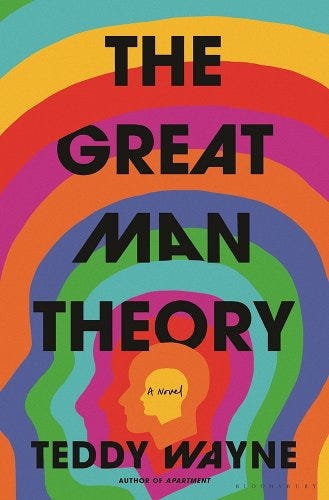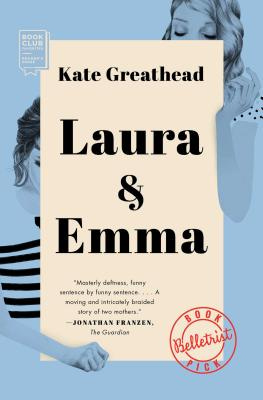I’ve known Teddy Wayne for a long time, first as one of the most consistently hilarious contributors to the McSweeney’s website when I was doing the editing (and since), and then as a novelist of uncommon accomplishment who manages to write books that are both culturally perceptive and page-turningly addictive.
Teddy’s latest novel is The Great Man Theory, which was described as, "At its finest, a worthy successor to those seriocomic novels of Bellow” by Brandon Taylor writing at The New York Times Book Review.
Teddy is also one of the most reliable recommenders of books that I read, and is the person who first recommended Alison Espach’s Notes on Your Sudden Disappearance, which regular readers know I found deeply compelling.
Teddy is recommending a book by someone he is very close to. As a reader, I can second his endorsement.
A Book I Wish More People Knew About - Teddy Wayne on Kate Greathead’s Laura & Emma.
I’ll air the disclaimer of disclaimers: Kate Greathead, the author of Laura & Emma, is my wife. If it diminishes the nepotism at all, Jonathan Franzen selected it as one of his three favorite novels of 2018, writing in The Guardian, praising her “masterly deftness, funny sentence by funny sentence. By the end, what seems to have been a casually episodic narrative reveals itself to be a moving and intricately braided story of two mothers.”
We begin in 1980 with Laura (no surname given), a thirty-year-old woman born into old-money WASP privilege in Manhattan. She’s highly repressed, uninterested in romance or sex, and guilt-ridden about her inherited money, much of which she gives away to liberal causes. She soon becomes pregnant from a one-night stand with a roguish man who disappears, and she decides to keep the baby but tell others she used a sperm donor.
The third-person novel follows the titular duo in vignettes spanning the next fifteen years, mostly focusing on Laura’s struggles for a selfhood distinct from her stifling environment and family, later on Emma’s own fish-out-of-water alienation in her world of future debutantes out of a Whit Stillman movie.
I understand if your reaction is to dismiss a book about two people’s discontentment with their affluence. Fortunately, the author (it feels strange to refer to her as “Greathead”), while laying bare the 1980s and ‘90s Upper East Side with sociological detail, also writes with precision about universal emotions.
She had already started the book when we met, but I didn’t read it until she was done with a draft. I hadn’t read much else she’d written, either, and we were both nervous about my reception; I imagine relationships between artists, especially those working in the same medium, are unsustainable if one person doesn’t respect the work of the other. I had been watching her tell stories onstage in the Moth for a while, however, and knew that she was a master of the six-minute oral anecdote, but skill as a raconteur doesn’t always translate into expertise at the written word.
Thankfully, I loved it. I’ll refer back to Franzen’s word, deftness; the Moth trained her how to compress a seemingly slight anecdote into a revealing three-page vignette, as did Mrs. Bridge and Mr. Bridge by Evan S. Connell, and the crisp prose is unerringly observant about people and atmosphere, with understated humor frequently its fuel. Here’s Laura’s best friend, Margaret, a dyed-in-the-wool Upper East Sider, as she gets married:
Evidently this was not the case for Margaret, who, upon being declared “husband and wife,” thrust a triumphant fist into the air, like an Olympian mounting the pedestal after receiving the gold.
And in the next paragraph, an evocative description of the city in springtime:
Following the ceremony there was a reception at the Carlyle. A fleet of London Towncars had been rented to chauffeur the guests, but Laura decided to walk. It had rained earlier and the late April air was ripe with freshly fallen petals and the loamy odor of wet concrete. Puddles reflected quivering images of the blossoming pear trees that lined Madison Avenue. The sun on the sidewalk radiated warmth; it felt like the city was waking up from a nap.
She sold the book a few months before we got married. We wrote our vows, and in mine I quoted a lengthy passage from her novel, written from Emma’s perspective in her elementary school’s morning “Prayers,” at which she spots a younger girl who had left school earlier in the year after a leukemia diagnosis and has just returned, her scalp now nearly bald:
They were still stuck in February but the light that filtered through the windows had a yolky glow. Spring was coming. Soon there would be blossoms on the trees, and Isabelle, who was not going to die after all, would have enough hair to tuck behind her ears. To the tune of “Amazing Grace,” Emma contemplated the miracle of these things, and she was overwhelmed with a feeling of goodness, and the blissful serenity that accompanies seeing the world through the simplicity of this lens. As the singing continued, the feeling intensified, and then, like a bolt of lightning, it suddenly occurred to Emma what really mattered in life. It wasn’t about cool versus uncool, pretty versus ugly, funny versus boring, or even happy versus sad, but goodness—goodness versus everything else that might not seem bad, but wasn’t good, either. To do good things, to be a good person: this was all that really counted.
Previously in “A Book I Wish More People Knew About”
Vol. 1: The Actual True Story of Ahmed and Zarga, recommended by Phyllis Mann.






I just found this book at Uncharted Books in Andersonville/Chicago. Once I’m done with Life on the Mississippi by Rinker Buck, I’ll dive right in!